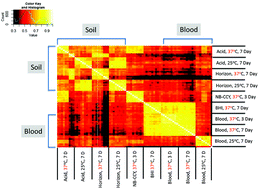Our official English website, www.x-mol.net, welcomes your feedback! (Note: you will need to create a separate account there.)
Proteomic signatures differentiating Bacillus anthracis Sterne sporulation on soil relative to laboratory media
Analyst ( IF 4.2 ) Pub Date : 2017-11-14 00:00:00 , DOI: 10.1039/c7an01412k D. S. Wunschel 1, 2, 3, 4 , J. R. Hutchison 1, 2, 3, 4 , B. L. Deatherage Kaiser 1, 2, 3, 4 , E. D. Merkley 1, 2, 3, 4 , B. M. Hess 1, 2, 3, 4 , A. Lin 1, 2, 3, 4 , M. G. Warner 1, 2, 3, 4
Analyst ( IF 4.2 ) Pub Date : 2017-11-14 00:00:00 , DOI: 10.1039/c7an01412k D. S. Wunschel 1, 2, 3, 4 , J. R. Hutchison 1, 2, 3, 4 , B. L. Deatherage Kaiser 1, 2, 3, 4 , E. D. Merkley 1, 2, 3, 4 , B. M. Hess 1, 2, 3, 4 , A. Lin 1, 2, 3, 4 , M. G. Warner 1, 2, 3, 4
Affiliation

|
The process of sporulation is vital for the stability and infectious cycle of Bacillus anthracis. The spore is the infectious form of the organism and therefore relevant to biodefense. While the morphological and molecular events occurring during sporulation have been well studied, the influence of growth medium and temperature on the proteins expressed in sporulated cultures is not well understood. Understanding the features of B. anthracis sporulation specific to natural vs. laboratory production will address an important question in microbial forensics. In an effort to bridge this knowledge gap, a system for sporulation on two types of agar-immobilized soils was used for comparison to cultures sporulated on two common types of solid laboratory media, and one liquid sporulation medium. The total number of proteins identified as well as their identity differed between samples generated in each medium and growth temperature, demonstrating that sporulation environment significantly impacts the protein content of the spore. In addition, a subset of proteins common in all of the soil-cultivated samples was distinct from the expression profiles in laboratory medium (and vice versa). These differences included proteins involved in thiamine and phosphate metabolism in the sporulated cultures produced on soils with a notable increase in expression of ATP binding cassette (ABC) transporters annotated to be for phosphate and antimicrobial peptides. A distinct set of ABC transporters for amino acids, sugars and oligopeptides were found in cultures produced on laboratory media as well as increases in carbon and amino acid metabolism-related proteins. These protein expression changes indicate that the sporulation environment impacts the protein profiles in specific ways that are reflected in the metabolic and membrane transporter proteins present in sporulated cultures.
更新日期:2017-11-22



























 京公网安备 11010802027423号
京公网安备 11010802027423号